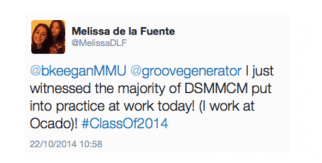Simon Swan interviews David Edmunson-Bird about teaching Digital Marketing in Higher Education
 In this interview Simon Swan talked to David Edmunson-Bird about the opportunities and challenges of teaching Digital Marketing in Higher Education.
In this interview Simon Swan talked to David Edmunson-Bird about the opportunities and challenges of teaching Digital Marketing in Higher Education.
David, AKA @Groovegenerator, is a Principal Lecturer in Digital Marketing and Enterprise and Associate Director at Manchester Metropolitan University and has worked for leading companies including BT. He has been involved in the teaching and training of Digital Business since 2004 and was active in setting up the BA (Hons) in Digital Media/Marketing and MSc in Digital Marketing, some of the first and best regarded Digital Marketing qualifications in the UK.
Q1. MMU seem to have been an early adopter in grasping the opportunity to create recognised digital qualifications, do you see this as a necessary in helping to drive awareness for MMU and being innovative?
We’ve got a brand awareness problem at MMU – people see only 'University of Manchester' and there’s a massive amount of snobbery and propaganda about HE based on how places were 30, 40 or 50 years ago. People have a very old fashioned idea of MMU based on it’s days as Manchester Poly – which it stopped being 22 years ago.
The modern MMU is about creating a dynamic and skilled workforce for the 21st century (and this isn’t just the usual corporate BS). Everyday I face prejudice from people who say they will only recruit from red brick universities, only to have them come back 6 months later begging for talent that can actually do something.
 I’ve been at the forefront of ensuring that we give graduates a lead in their ability as digital skilled employees, able to do stuff from the day they land in work as well as give them qualities, knowledge and attitudes that they can use decades later. This tweet really sums it up for me from one of our graduates
I’ve been at the forefront of ensuring that we give graduates a lead in their ability as digital skilled employees, able to do stuff from the day they land in work as well as give them qualities, knowledge and attitudes that they can use decades later. This tweet really sums it up for me from one of our graduates
So getting in first and innovating with our learning, the content and the attitude is what makes us different. We have to take risks in order for us to build a resilient, knowledgeable workforce that can get us moving as an economy again.
So Digital Innovation allows us to provide a unified outward fascia and consider a joined up approach to new things we are in the process of developing. We’re very big in 3D printing for example, which allows industry to access expertise previously seen as a bit invisible.
Q2. With the ever growing digital channels available to market do you see change in how digital will be taught within universities?
I think there are some fundamental principles that remain the same and over time I’ve seen these principles come out irrespective of the channels.
You can master a channel in a day but to become an accomplished communications professional takes years. Beginning to understand what those principles are is what University at MMU is about along with the chance to apply things in practice.
Q3. To service the sudden demand for recognised digital training (e.g. SEO, PPC, content, social media) there has been an increase with agencies launching their own in-house training programs for industry people to learn – do you see this rivalling what universities have to offer?
I think this is a very short-term thing as agencies realise they need talent. But agencies really need to focus on what they are good at – sure they might be good at short-term, quick fix learning (about a specific channel) but there are longer term learning objectives that they are not really geared up to dealing with.
Q4. Should Higher Education (universities) be providing more of a digital marketing syllabus to graduates or should graduates not worry so much about formal qualifications and go work for a start-up?
That’s a lot of different questions – I think that higher education gives you a grounding in critical thinking, knowing how to spot risks, knowing how to make extremely complex decisions. I do that in the context of digital marketing because I need graduates to go and be useful very quickly.
If a start-up is all about digital marketing, I know I would want to attract the talent that knew what it was doing as well as had those critical thinking qualities.
Q5. What's your thoughts on the next frontier/challenge for digital marketing?
My research is on the big fight out between Search and PR – the merging of search and social activity means it’s difficult to know which is the profession to back.
PR has had years out in the digital wilderness but social means it has a new role which search professionals find difficult to manage. The real winners will be the folks who do both.
Q6 Any advice for a newbie digital marketer learning the trade?
Try these:



 In this interview Simon Swan talked to
In this interview Simon Swan talked to  I’ve been at the forefront of ensuring that we give graduates a lead in their ability as digital skilled employees, able to do stuff from the day they land in work as well as give them qualities, knowledge and attitudes that they can use decades later. This tweet really sums it up for me from one of our graduates
I’ve been at the forefront of ensuring that we give graduates a lead in their ability as digital skilled employees, able to do stuff from the day they land in work as well as give them qualities, knowledge and attitudes that they can use decades later. This tweet really sums it up for me from one of our graduates



